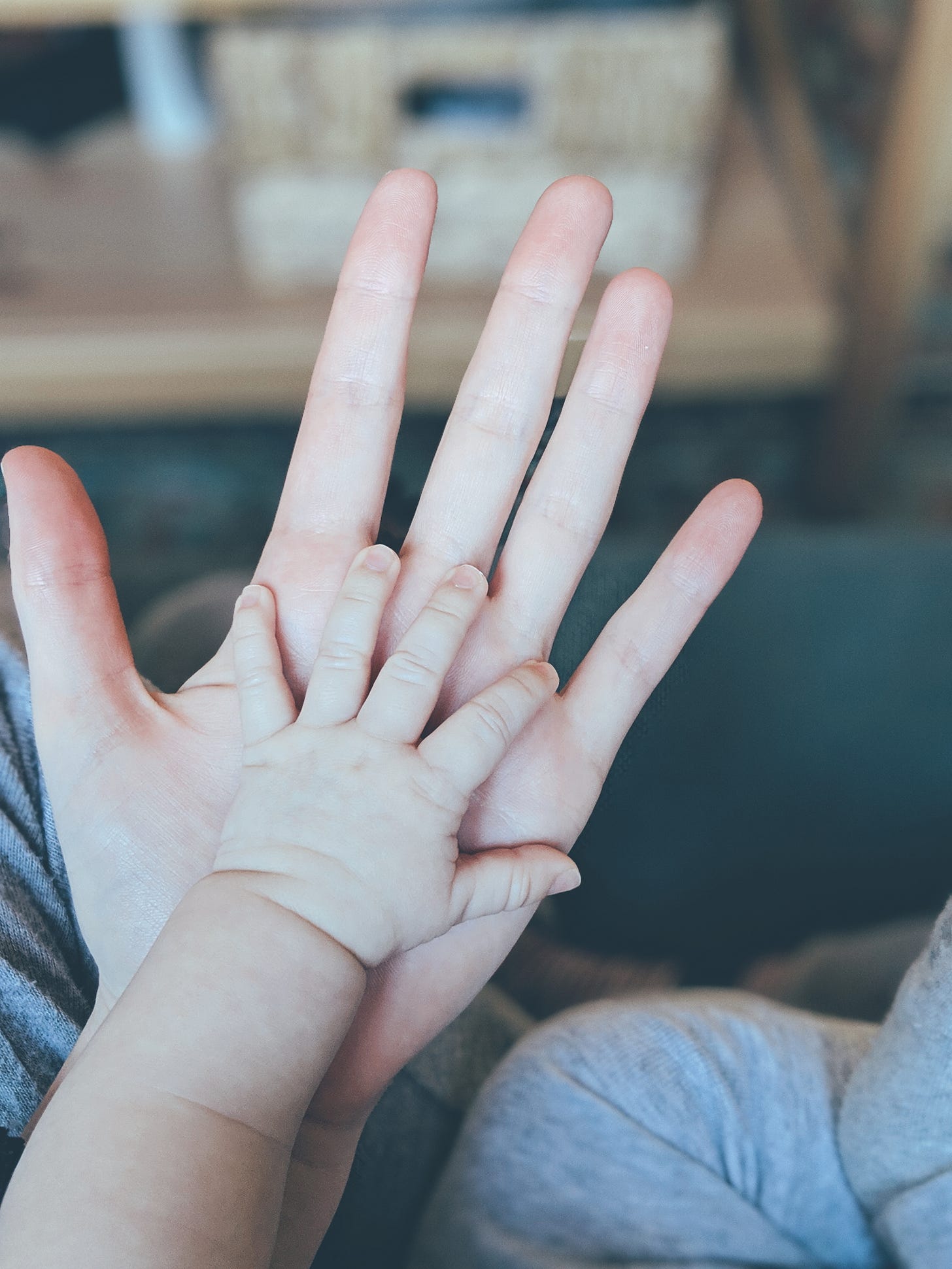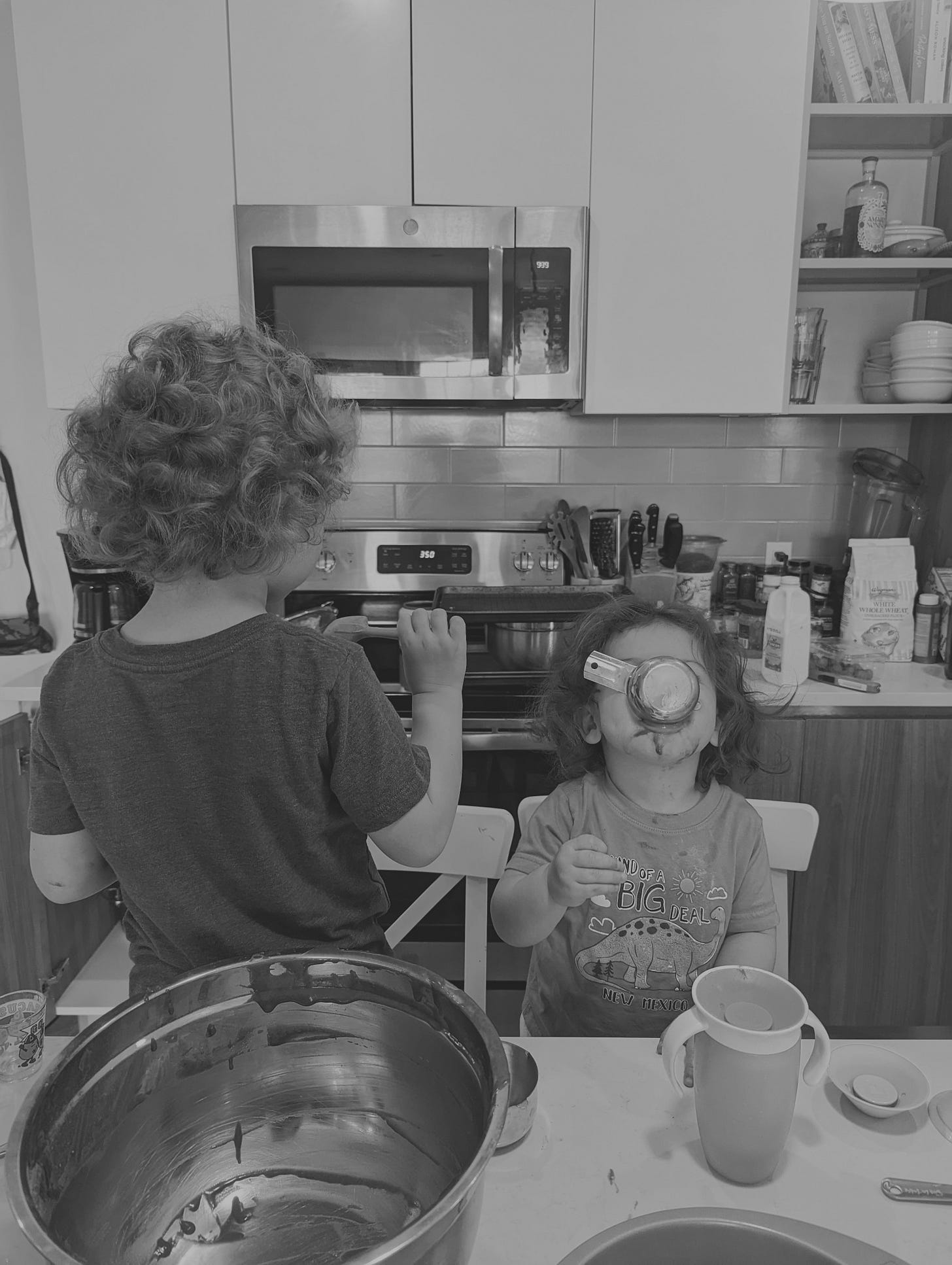The intergenerational food and body obsession has to end with me: the dietitian
My mom's story of struggling with eating and body image flows effortlessly into mine. I don't want my children to be next.
An update on food & stuff:
Starting next week, I will be taking a slower pace with this newsletter. Instead of publishing twice a week, you’ll be hearing from me once per week on Thursday mornings for the foreseeable future. That amount feels more sustainable for me in the long term right now, and I am trying to reject my thoughts about more being “better”. I’d like to shout out
’s recent newsletter that helped me make this decision. Thanks for being here with me as I’m figuring this out!Notes on the story below:
This week I am sharing a personal story about my history of dieting and disordered eating.1 My hope is that it helps shed light on some of the reasons why I practice nutrition in the way that I do, particularly for those of you who have gotten to know me in a formal work setting and perhaps seen me bristle at the question: “how many calories should I be eating?” or “can you tell me the best way to lose weight quickly?”
My story is one that involves white, thin privilege. My own struggles with food and eating have all taken place in a body that is generally accepted and praised by society, which has made my experience easier than what many other people face. People with larger bodies, people of color, and people from marginalized communities bear the brunt of body shaming and systemic biases. Challenging the underlying issues that perpetuate beauty standards is an important part of the dismantling of oppressive structures - and we can’t do that if we’re spending all of our time focused on upholding those standards in our own bodies.
*Content Warning: Disordered Eating, Calorie Counting, Weight Discussions*
When my mom2 graduated college with a degree in aviation and applied to be a flight attendant, she nervously stepped on the scale in her interview and worried that if she gained one pound, she was at risk of being disqualified due to the strict weight standards.
This wasn’t the first time she thought her body was too big.
It started in middle school when teasing by her peers led her to a local pharmacy to secretly buy over-the-counter weight loss pills. In high school, she continued to find new ways to control her weight, like not eating for long periods of time in preparation for events like prom. By college, it was coffee and cigarettes for breakfast, and a lot of exercising.
Her story of struggling with body image and eating flows effortlessly into mine.
I vividly remember the first time my mom pointed with disdain to the cellulite on her thighs as she tried on bathing suits in her bedroom. I was about 10 years old and “cellulite” became a new word in my vocabulary on that day. Soon after, I sat on the carpet in my bedroom in my soffe shorts (IYKYK) and extended out my legs. To my horror, I also had cellulite! I wondered how long it had been there, and if anyone else had seen it. As it screamed for my attention in the mirror each day, I desperately wished it would go away.
By the time I was a teenager, I fully hated all the parts of my body, just like my mom hated hers.
I started trying to control my appearance and weight using the same methods I watched generations before me use: eating “healthy” foods, calorie counting, and exercising as much as I could. I experimented with veganism and trained harder for cross country.
I became so obsessed that I decided to study nutrition full-time and become a registered dietitian. (That’s how much diet culture has permeated my life, *sigh*.)
According to my email archives, I signed up for MyFitnessPal, a food and exercise tracking app, in November 2011. I was a freshman at Syracuse University in my first semester of the nutrition and dietetics program. I would continue to count my calories on and off every time I saw myself start to gain weight, stopping only when the weight had been lost, for the next seven years: as an undergraduate, as a dietetic intern, while getting my Master’s degree in nutrition, and while I worked my first job as a dietitian for ShopRite. Calorie counting and exercising daily were with me through so many important life moments: my time living abroad in Turkey, my wedding, and even my first pregnancy. I had no intention of stopping, and I didn’t until I was forced to by circumstance.
The last day I logged my food intake on MyFitnessPal was November 26, 2018: the day my water broke and I went into labor with my son.3
My difficult recovery from childbirth meant I needed to sit and wait to see what would happen when I didn’t exercise for over 2 months. Breastfeeding left me so ravenously hungry that I couldn’t imagine eating any less. So I sat, and I ate, and I waited. I watched my leg muscles soften and my hips and belly take on new shapes.
It was freeing in the most uncomfortable way.
I don’t remember actively making the decision at some point in that postpartum period to be more gentle with myself permanently: to eat food in a way that prioritizes satisfaction and to shift from HIIT and long-distance running to walking and yoga.
Ultimately, I think I probably had a lot of moments when I wanted to go back to calorie counting and intense exercise, but just kept putting it off for one more day because it felt really good to not be doing those things.
I’m still trying to figure all of this out, and I assume I will be for the rest of my life. On days when my younger, calorie-counting self is whispering my name from the other side of the mirror, the best thing for me to do has been to look away from her and toward my children. I do this both to remember how grateful I am for my body for growing them and to remind myself that what I’m doing is about them as much as it’s about me.
I don’t want them to watch me pick apart my body, and then turn around and use those words on themselves and others.
If you want to read more on this topic, I highly recommend Fat Talk: Parenting in the Age of Diet Culture by
! Here’s a mic-drop-worthy quote from the introduction.“When we teach our kids that their bodies need to be small to be good, we are also teaching them that their bodies need to be controlled. They learn that left to their own devices, bodies are untrustworthy, unpredictable, and dangerous. This has consequences for how they explore their gender and sexuality, and for how safe they feel in their bodies. It informs how much they can even expect to have body autonomy. This is not what we want any of our kids to grow up knowing. But we can’t edit or rewrite every cultural message our children get about gender roles and control, because the onslaught will never stop. Instead, we must teach them how to recognize and reject these messages — even when they hear them from us.” - in Fat Talk: Parenting in the Age of Diet Culture
My mom’s story is shared with her permission.
I had to look this up, and was really surprised to see this date. In my mind, I had not been tracking like that so recently.







Wow, we need to discuss this more. So many similarities. This was a great read!